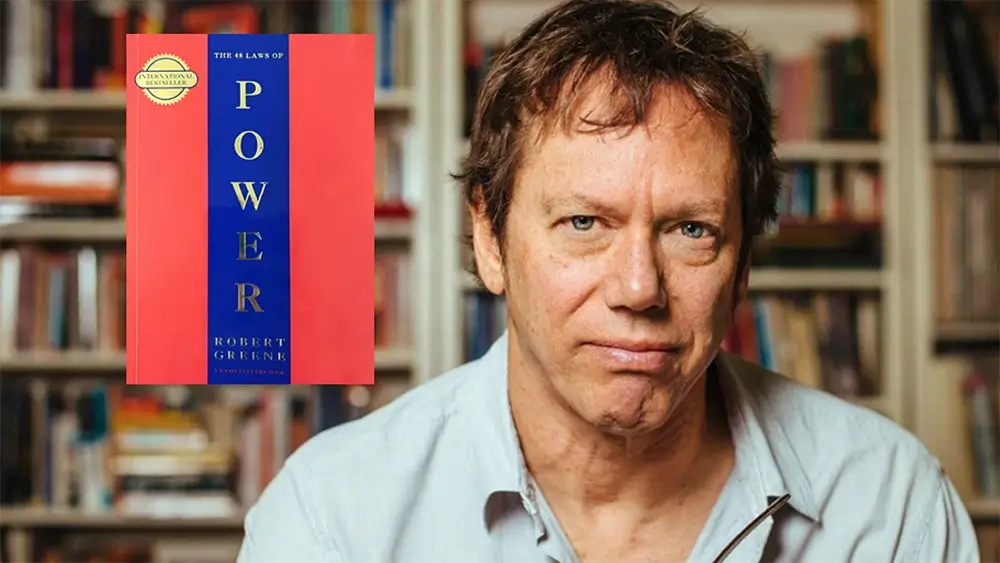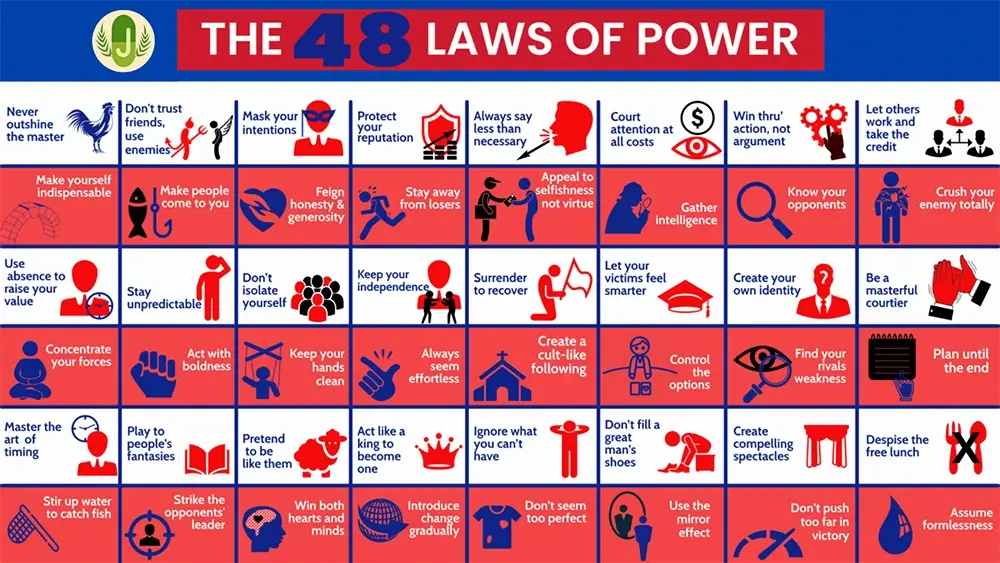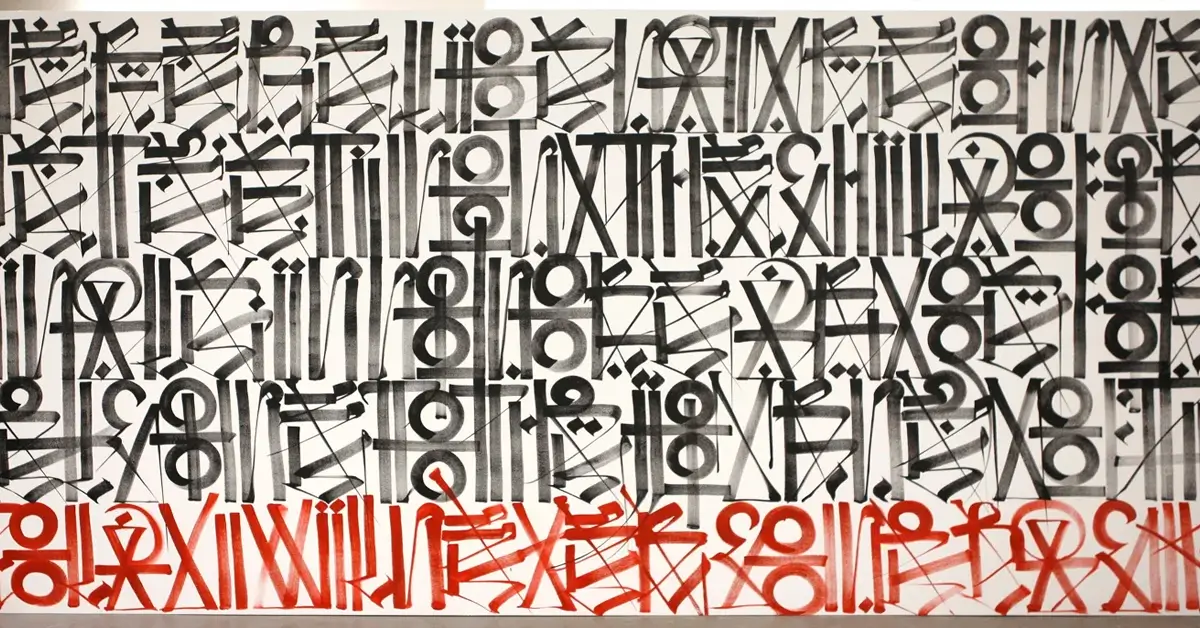The 48 Laws of Power Banned In Prisons
Robert Greene`s 48 Laws of Power is known to be popular reading among prisoners of the American prison system, as well as celebrities. The bestseller offers 48 laws on how to live your life and gain self-confidence. Greene studied the lives of Henry Kissinger and P.T. Barnum and borrowed the philosophies of Machiavelli and Sun Tzu to develop his 48 principles.
As popular as the book, it is also on the prohibition list of many prisons. In fact, as of 2017, there are only two books that are explicitly banned in Utah prions, both Robert Greene is the author: The 48 Laws of Power and The Art of Seduction. Utah`s prison system believes both books have the ability to teach inmates how to manipulate others. But many institutions seem to go a step further in the rules, censoring material far beyond specific guidelines, frequently adding new books to the list of banned books. Some prisons do not allow prisoners to receive books at all.
So what books can you read in prison? Books banned in prisons differ from state to state, with some being much stricter than others. Robert Greene`s The 48 Laws of Power is known to be popular reading among prisoners in the United States prison system, as well as celebrities.
The 48 Laws of Power and Greene`s successor, The Art of Seduction, are both banned books. The following anthology of books has been banned from prisons, and some of the titles may seem surprising and downright ridiculous. Read on to learn more about why some books are banned in prison. Similarly, why are The 48 Laws of Power banned in prisons? The ban was classified as a security measure, accompanied by a brief explanation. Prison officials were concerned that the books, Jensen said, could show inmates «how to control people, how to get people to do exactly what you want them to do.
Knowledge Is Power
Law 15: Totally destroy your enemy. Jeffrey Pfeffer, a professor at Stanford University, thinks it`s cumbersome and impractical when it comes to lists of laws. Moreover, Pfeffer argues, Greene`s laws are flawed because they are not rooted in research, study, or experimentation. Although it has been banned in many libraries over the years and was on the list of the most banned books from 2000 to 2009, it was the most banned in the South. Robert Greene`s The 48 Laws Of Power is just one of many books banned by some U.S. correctional facilities.

It has sold more than 1.2 million copies in the U.S. alone, but its rediscovery by a TikToker comes amid renewed interest in the book. Greene first articulated some of the ideas in The 48 Laws of Power while working as a writer in Hollywood and concluded that today`s power elite shared similar traits with powerful figures throughout history and realized that he could push people who wanted to succeed. In 1995, Greene was working as a writer at the Fabrica School of Art and Media and met a book packer named Joost Elffers. Greene presented Elffers with a book on power, and six months later, Elffers asked Greene to write a treatment.
Mind Power
Law 44: Disarm and get angry at the mirror effect. By holding up a mirror to their psyche, you seduce them with the illusion that you share their values; by holding up a mirror to their actions, you are teaching them a lesson. Few people can resist the power of the mirror effect. The Michigan Department of Corrections has Zodiac Unmasked on its list of banned books because it purportedly outlines instructions to commit criminal activity. Let us now reflect on the workings of power by examining the three laws of power.

The 48 Acts of Power are also prohibited in some U.S. correctional facilities, including the Utah State Penitentiary. He appeared on the Minneapolis Art Festival`s list of 400 banned books, alongside Noam Chomsky`s On Anarchism and the National Geographic photo book Visions Of Paradise. The Utah State Penitentiary recently banned Robert Greene`s The 48 Laws of Power and The Art of Seduction.
Both works contain themes such as power, seduction, and war, around which Greene centers many of his works. Professor Jeffrey Pfeffer said Greene`s so-called laws are based on isolated examples rather than solid research. Kirkus Reviews stated that Greene offered no evidence of his worldview, that Greene`s laws contradicted each other, and that the book was simply absurd.
Newsweek also points out how the laws contradict each other, saying, with the contrary intent, Greene has actually made one of the best arguments for humility and darkness since the New Testament. Director Magazine notes that some of Greene`s `laws` seem contradictory and that the work is clumsy and didactic. Maurice Sendak`s Where the Wild Things Are is one of many fascinating additions to the list of banned books, which is being expanded to include books that have been challenged but not banned in schools and public libraries.
The classic work of Sendak was banned in schools because some people felt that the dark and occult nature of the story was not suitable for the age group. Max`s trip to the land where the wild things are found was considered too scary for the young minds for whom the story is intended. This idea, and the eventual ban on the book, was encouraged by an article written by Bruno Bettelheim, a well-known child psychologist in the 1960s, for Ladies` Home Journal, saying exactly that.
Also, which book is banned in prisons? Atomic Seven. This guide describes the unspoken rules of prison. The authors tell true stories and anecdotes from more than 80 prisoners or former inmates about prison life and the functions of the system. The book is banned in prisons in Florida, Michigan, New Hampshire and California. He asked them which laws of the book were most troubling. He cites Articles 33, 11, six and three.
As the only titles on the prison`s list of banned books, Robert Greene`s The 48 Laws of Power and The Art of Seduction are not allowed in the institution`s imposing metal fences. The reason? It is a question of manipulation. Greene first articulated some of the ideas in The 48 Laws of Power while working as a writer in Hollywood, concluding that today`s power elite shared similar traits with powerful figures throughout history and realized he could push people who wanted to succeed.
In 1995, Greene was working as a writer at the Fabrica School of Art and Media and met a bookpacker named Joost Elffers. Greene presented Elffers with a book on power, and six months later Elffers asked Greene to write a treatment. Although it has been banned in many libraries over the years and was on the list of the most banned books from 2000 to 2009, it was the most banned in the South. Advanced Home Wiring, published by Black & Decker, is, as its title suggests, a self-help manual for the budding DIY electrician.
It guides the reader through various methods of installing electrical components and the basics of electronic wiring systems, from a lamp to a remote-controlled garage door opener. But the Michigan Department of Corrections considers the book an escape manual and banned it from its prisons starting in February 2017. At first glance, this prohibition may seem logical and wise, even considering the paradoxical fact that the same prisoners who were denied access to the book could enroll in professional training courses as electricians.
Inmates across the country who are locked up in prisons at all security levels have the opportunity to learn a trade. Michigan authorities apparently find that practical lessons from a certified instructor pose less of a security threat than the same information that comes in book form. Concerned parties in the United States ban books for more than dark topics and incorrect grammar. The Utah State Penitentiary recently banned Robert Greene`s The 48 Laws of Power and The Art of Seduction.
Both works contain themes such as power, seduction, and war, around which Greene centers many of his works. While these issues are the source of many social, political or economic interactions, officials at the Utah correctional facility were concerned that the books would teach inmates the art of manipulation.
The Salt Lake Tribune explained that the books were banned as a safety precaution by an official who no longer works for the prison. There`s something about the books we read as children and the ones we had to read in high school English classes that accompany us in strange ways as we get older.
We often recognize titles when they appear in conversations or appear on lists of banned books. The University of Utah hosts a large number of banned books and participates in Forbidden Book Week to raise awareness about banned books to celebrate the freedom we need to read.




